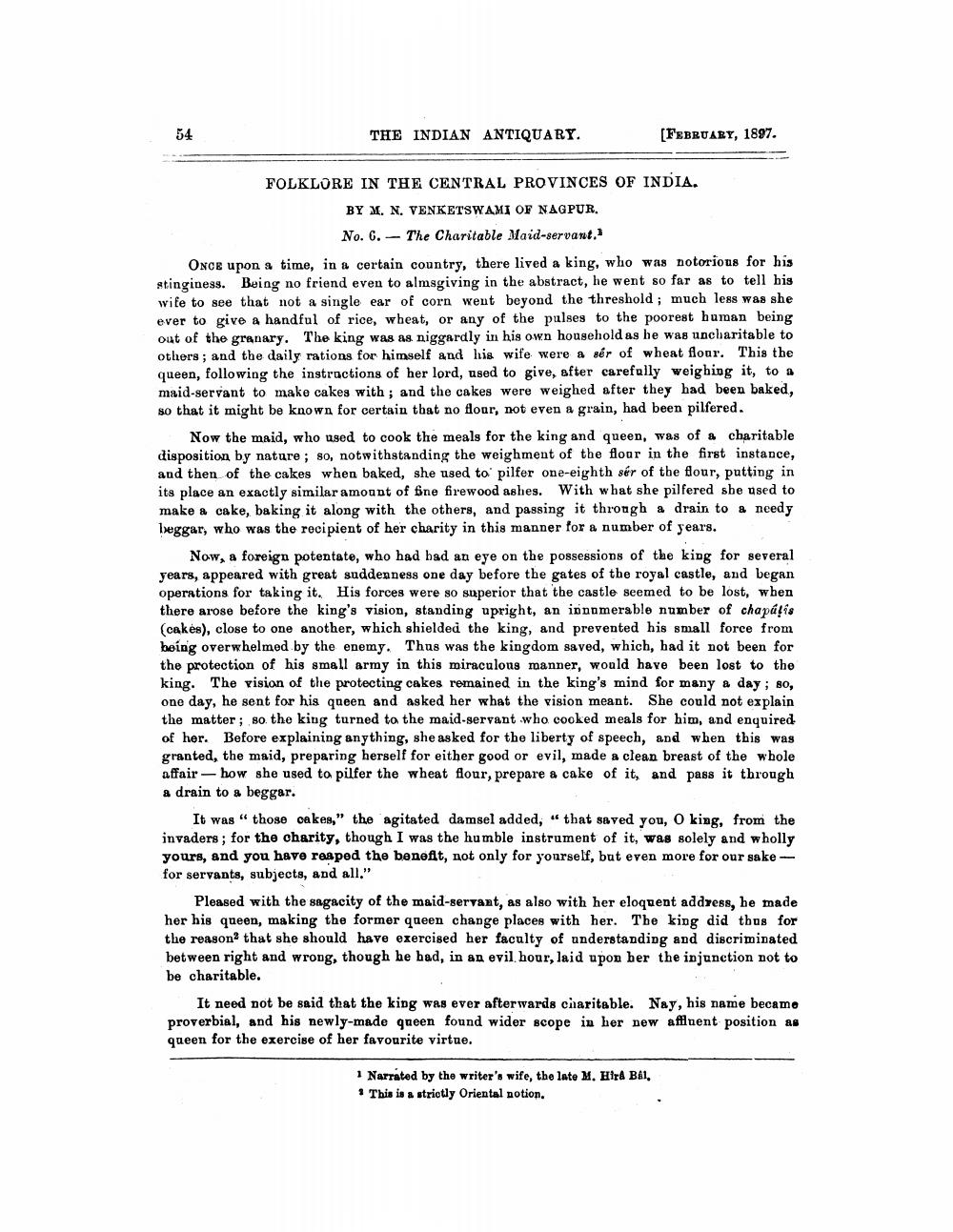________________
54
THE INDIAN ANTIQUARY.
[FEBRUARY, 1897.
FOLKLORE IN THE CENTRAL PROVINCES OF INDIA.
BY M. N. VENKETSWAMI OF NAGPUR.
No. 6. - The Charitable Maid-servant." Once upon a time, in a certain country, there lived a king, who was notorious for his stinginess. Being no friend even to almsgiving in the abstract, he went so far as to tell his wife to see that not a single ear of corn went beyond the threshold ; much less was she ever to give a handful of rice, wheat, or any of the pulses to the poorest human being out of the granary. The king was as niggardly in his own household as he was uncharitable to others; and the daily rations for himself and his wife were a sér of wheat floor. This the queen, following the instractions of her lord, used to give, after carefully weighing it, to a maid-servant to make cakes with; and the cakes were weighed after they had been baked, so that it might be known for certain that no flour, not even a grain, had been pilfered.
Now the maid, who used to cook the meals for the king and queen, was of a charitable disposition by nature ; so, notwithstanding the weighment of the floor in the first instance, and then of the cakes when baked, she used to pilfer one-eighth sér of the flour, putting in its place an exactly similar amount of fine firewood ashes. With what she pilfered she used to make a cake, baking it along with the others, and passing it through a drain to a needy beggar, who was the recipient of her charity in this manner for a number of years.
Now, a foreign potentate, who had had an eye on the possessions of the king for several years, appeared with great suddenness one day before the gates of the royal castle, and began operations for taking it. His forces were so superior that the castle seemed to be lost, when there arose before the king's vision, standing upright, an innamerable number of chapális (cakes), close to one another, which shielded the king, and prevented his small force from being overwhelmed by the enemy. Thus was the kingdom saved, which, had it not been for the protection of his small army in this miraculous manner, would have been lost to the king. The vision of the protecting cakes remained in the king's mind for many a day; 80, one day, he sent for his queen and asked her what the vision meant. She could not explain the matter; so the king turned to the maid-servant who cooked meals for him, and enquired of her. Before explaining anything, she asked for the liberty of speech, and when this was granted, the maid, preparing herself for either good or evil, made a clean breast of the whole affair - how she used to pilfer the wheat flour, prepare a cake of it, and pass it through a drain to a beggar.
It was those cakes," the agitated damsel added, " that saved you, O king, from the invaders; for the charity, though I was the humble instrument of it, was solely and wholly yours, and you have reaped the benefit, not only for yourself, but even more for our sakefor servants, subjects, and all."
Pleased with the sagacity of the maid-servant, as also with her eloquent address, he made her his queen, making the former queen change places with her. The king did thus for the reason that she should have exercised her faculty of understanding and discriminated between right and wrong, though he had, in an evil hour, laid upon her the injunction not to be charitable.
It need not be said that the king was ever afterwards charitable. Nay, his name became proverbial, and his newly-made queen found wider scope in her new affluent position as queen for the exercise of her favourite virtue.
Narrated by the writer's wife, the late M. Hira Bal. . This is a strictly Oriental notion.




